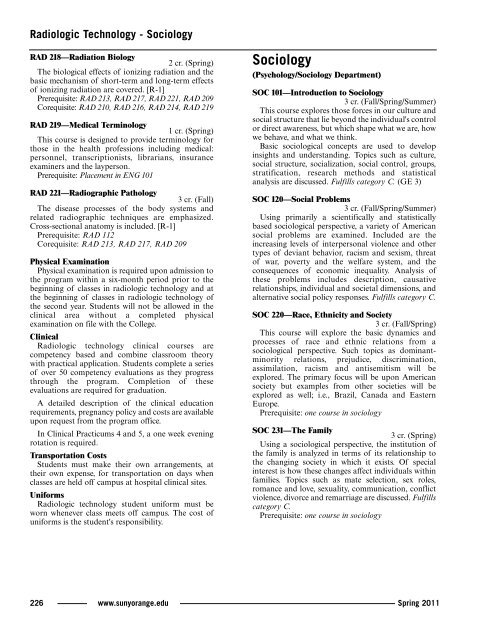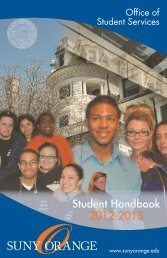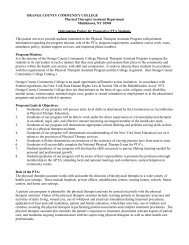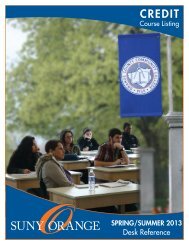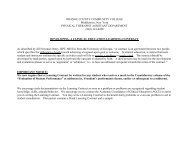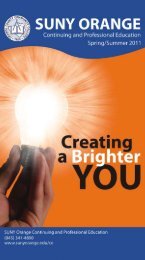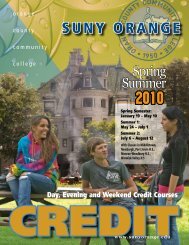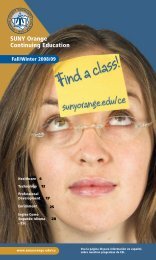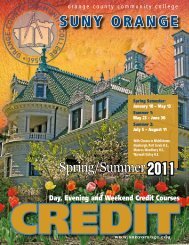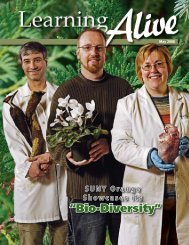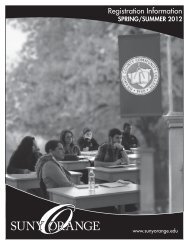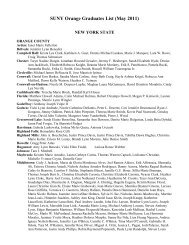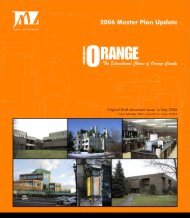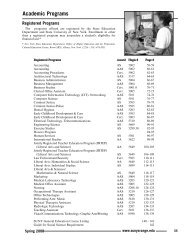Indexed Adobe PDF (Spring 2011-Full Version) - SUNY Orange
Indexed Adobe PDF (Spring 2011-Full Version) - SUNY Orange
Indexed Adobe PDF (Spring 2011-Full Version) - SUNY Orange
- No tags were found...
You also want an ePaper? Increase the reach of your titles
YUMPU automatically turns print PDFs into web optimized ePapers that Google loves.
Radiologic Technology - SociologyRAD 218—Radiation Biology2 cr. (<strong>Spring</strong>)The biological effects of ionizing radiation and thebasic mechanism of short-term and long-term effectsof ionizing radiation are covered. [R-1]Prerequisite: RAD 213, RAD 217, RAD 221, RAD 209Corequisite: RAD 210, RAD 216, RAD 214, RAD 219RAD 219—Medical Terminology1 cr. (<strong>Spring</strong>)This course is designed to provide terminology forthose in the health professions including medical:personnel, transcriptionists, librarians, insuranceexaminers and the layperson.Prerequisite: Placement in ENG 101RAD 221—Radiographic Pathology3 cr. (Fall)The disease processes of the body systems andrelated radiographic techniques are emphasized.Cross-sectional anatomy is included. [R-1]Prerequisite: RAD 112Corequisite: RAD 213, RAD 217, RAD 209Physical ExaminationPhysical examination is required upon admission tothe program within a six-month period prior to thebeginning of classes in radiologic technology and atthe beginning of classes in radiologic technology ofthe second year. Students will not be allowed in theclinical area without a completed physicalexamination on file with the College.ClinicalRadiologic technology clinical courses arecompetency based and combine classroom theorywith practical application. Students complete a seriesof over 50 competency evaluations as they progressthrough the program. Completion of theseevaluations are required for graduation.A detailed description of the clinical educationrequirements, pregnancy policy and costs are availableupon request from the program office.In Clinical Practicums 4 and 5, a one week eveningrotation is required.Transportation CostsStudents must make their own arrangements, attheir own expense, for transportation on days whenclasses are held off campus at hospital clinical sites.UniformsRadiologic technology student uniform must beworn whenever class meets off campus. The cost ofuniforms is the student's responsibility.Sociology(Psychology/Sociology Department)SOC 101—Introduction to Sociology3 cr. (Fall/<strong>Spring</strong>/Summer)This course explores those forces in our culture andsocial structure that lie beyond the individual's controlor direct awareness, but which shape what we are, howwe behave, and what we think.Basic sociological concepts are used to developinsights and understanding. Topics such as culture,social structure, socialization, social control, groups,stratification, research methods and statisticalanalysis are discussed. Fulfills category C. (GE 3)SOC 120—Social Problems3 cr. (Fall/<strong>Spring</strong>/Summer)Using primarily a scientifically and statisticallybased sociological perspective, a variety of Americansocial problems are examined. Included are theincreasing levels of interpersonal violence and othertypes of deviant behavior, racism and sexism, threatof war, poverty and the welfare system, and theconsequences of economic inequality. Analysis ofthese problems includes description, causativerelationships, individual and societal dimensions, andalternative social policy responses. Fulfills category C.SOC 220—Race, Ethnicity and Society3 cr. (Fall/<strong>Spring</strong>)This course will explore the basic dynamics andprocesses of race and ethnic relations from asociological perspective. Such topics as dominantminorityrelations, prejudice, discrimination,assimilation, racism and antisemitism will beexplored. The primary focus will be upon Americansociety but examples from other societies will beexplored as well; i.e., Brazil, Canada and EasternEurope.Prerequisite: one course in sociologySOC 231—The Family3 cr. (<strong>Spring</strong>)Using a sociological perspective, the institution ofthe family is analyzed in terms of its relationship tothe changing society in which it exists. Of specialinterest is how these changes affect individuals withinfamilies. Topics such as mate selection, sex roles,romance and love, sexuality, communication, conflictviolence, divorce and remarriage are discussed. Fulfillscategory C.Prerequisite: one course in sociology226 www.sunyorange.edu <strong>Spring</strong> <strong>2011</strong>


